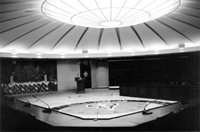 | ||
What do PCOs do?
From distributing announcements to preparing necessary equipment, PCOs engage in every aspect of preparing a meeting. In international meetings, they must book flights and hotels for keynote speakers, plan the entire convention process, as well as prepare social gatherings such as ceremonies and tours. Consequently, there are technical tours where guests visit related factories and companies. All of these programs must be planned by PCOs. Deciding who to assign for what project are all under PCOs' responsibilities.
Why PCOs are important
Conventions themselves have developed into an industry of their own, and are viewed to be the core of communication venues in the global era. Since successful conventions help improve the nation's image, there is an increasing interest in holding international meetings. The Seoul Metropolitan Government made an industrial-academia pact on Jan. 27 with research centers, corporations, and 16 universities, including Yonsei Univ., which demonstrated the growing support for the convention industry. For such conventions to be successful and help the national economy in the future, PCOs' roles are critical.
As is the case with any job, meeting planners face hardships as well. Although preparing international conventions mostly take years, the hard work is judged only by the short number of days when the convention is actually held. If problems occur during this time, their work will come to nothing. However, meeting various leaders in diverse fields and helping change negative impressions of Korea are among the great attractions of this job. In addition, PCOs take pride in that they contribute to the nation's economy, since the convention industry is strongly related to our nation's tourist industry.
How to become a PCO
Becoming a PCO does not necessarily require special test qualifications. There is a PCO certificate, but it does not guarantee a job in this field. Although there are also universities with convention-related majors, Director Kim says that studying business marketing is helpful in this field. "Short-term courses on conventions are good enough. In the convention industry, experience is valued above anything else," he explains. After about six months of learning basic convention theories and marketing you can apply these skills at convention centers, organization companies, or the Host Committee.
The number of recruitments vary from year to year. For instance, the COEX Convention Team employs less than ten people each year, but this number changes according to the team's situation. Thus, it is important to constantly check for recruitment announcements posted by convention organization companies.
To Yonseians
Being a PCO entails contributing to the nation in a global aspect. "One must see PCOs from a wider perspective, not just the work they do in the office," says Kim. With open-mindedness toward culture and language, Yonsei Univ. students can make great PCOs in the future. Especially with the government's academic support to Yonsei Univ., the future definitely looks bright for this exemplary career path.

